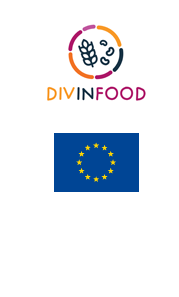Divinfood
constructing interactive short and mid-tier food chains to value agrobiodiversity in healthy plant-based food
CONTACT
Christophe Cotillon & Gemma Cornuau (Actia)
Tel. : 33 (0)6 14 08 91 41 - 33 (0)6 18 69 52 13
COORDINATION
Inrae (France)
Partners
Twenty-six full partners representing seven different countries:
Denmark (DVF, Icoel), France (Actia, Biocivam 11, CRBA-Applied Botany Resource Center, Inrae, Paul Bocuse Institute, My Producer my Chef, Open Food Facts, Open Food France), Hungary (Association of Conscious Consumers, AgriKulti, Budapest municipality, Omki-Research institute of organic agriculture, Svet-Rural gastronomic restaurant), Italy (Council for Agricultural Research and Economics, Firab-The Italian Foundation for Research in Organic and Biodynamic Agriculture, university of Pisa), Portugal (Adeca, CookingLab, new university of Lisbon, university of Evora), Sweden (Nordvara, Swedish University of Agricultural Sciences), Switzerland (FIBL-Research Institute of Organic Agriculture).
begining of PROJEcT
March 2022
DURation
60 months
Reference
Objectives
The overall objective of this multi-actor, participatory project is to facilitate the use and increase the value of Neglected and Underutilised Crops (NUCs) in food chains to foster healthier diets and more sustainable food systems.
To achieve this, Divinfood will focus on interactive short and mid-tier value chains that can meet the growing consumer demand for:
- healthy plant-based food;
- products with a local/regional identity,
- diverse services and benefits received from agriculture and food.
Divinfood will study minor cereals and legumes in 3 geographical regions that face various climatic hazards and diverse socio-economic challenges to developing agrobiodiversity-rich value chains. Divinfood will:
- Co-develop, with consumers, new interactive marketing modes and channels valuing biodiversity use and its services/benefits, with the support of participatory guarantee systems and digital tools
- Co-produce new and diversified plant-based healthy and appetising products and recipes from NUCs meeting consumers’ needs, from minimal or mild food processing and formulations better expressing NUCs’ potential - Benchmark diverse agroecological farming systems and techniques that improve NUCs’ performance, inter-specific biodiversity and the provision of citizen-focused agro-socio-ecosystem services
- Breed more performant cultivars of cereals and legumes with local adaptation, intra-specific biodiversity, biotic and abiotic stress tolerance, and potentiating nutritious and appetising food
- Demonstrate new business models that diversify income and activities for farmers and small-scale processors who are using agrobiodiversity
- Co-design pilot multi-actor territorial networks/social cooperatives in charge of managing, propagating and promoting NUCs. Design policy recommendations to promote their replication
- Disseminate the results to relevant stakeholders to optimise their exploitation.
Actions




